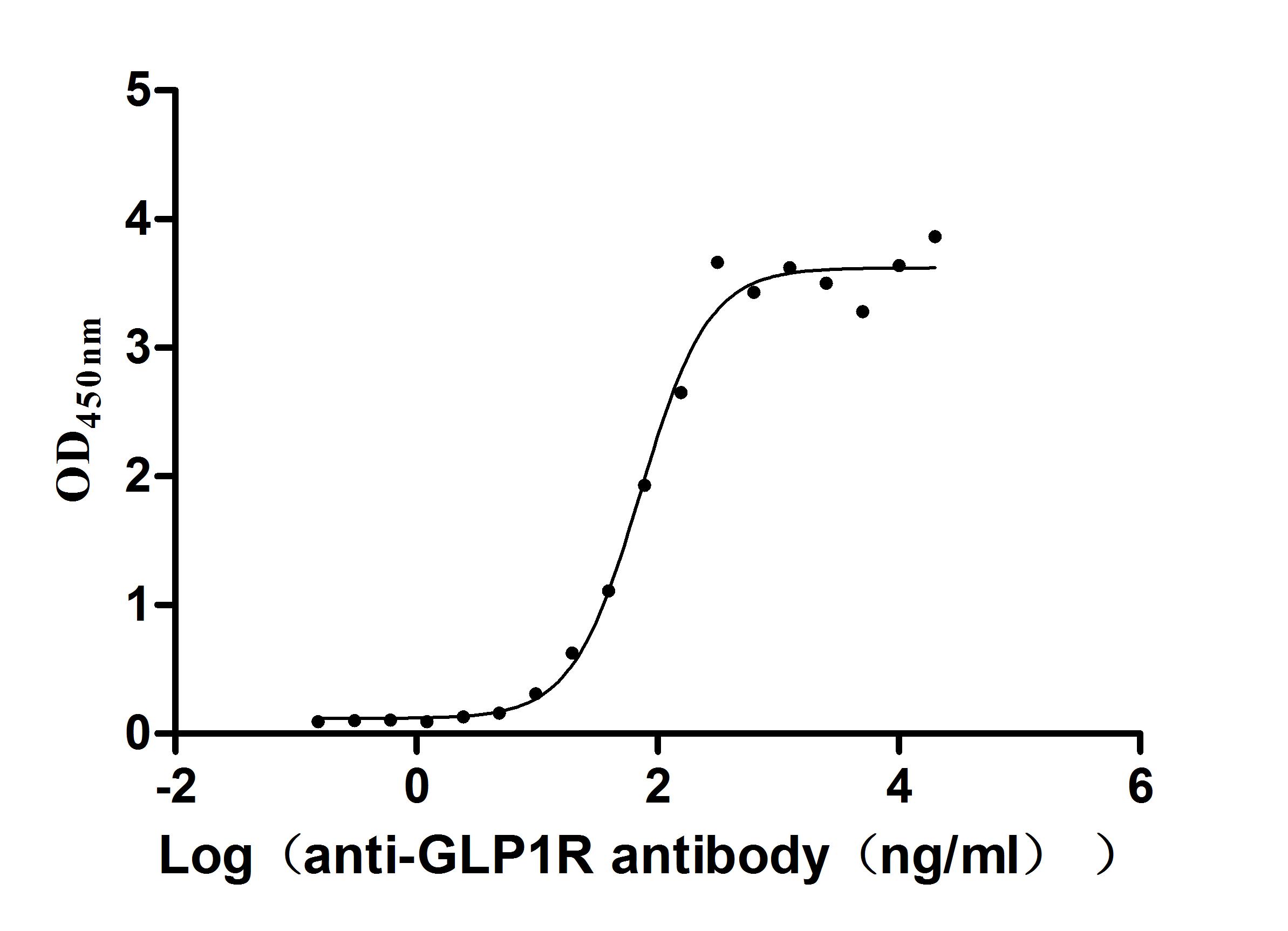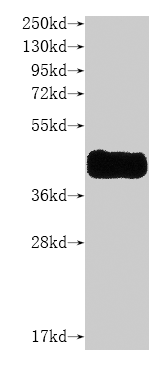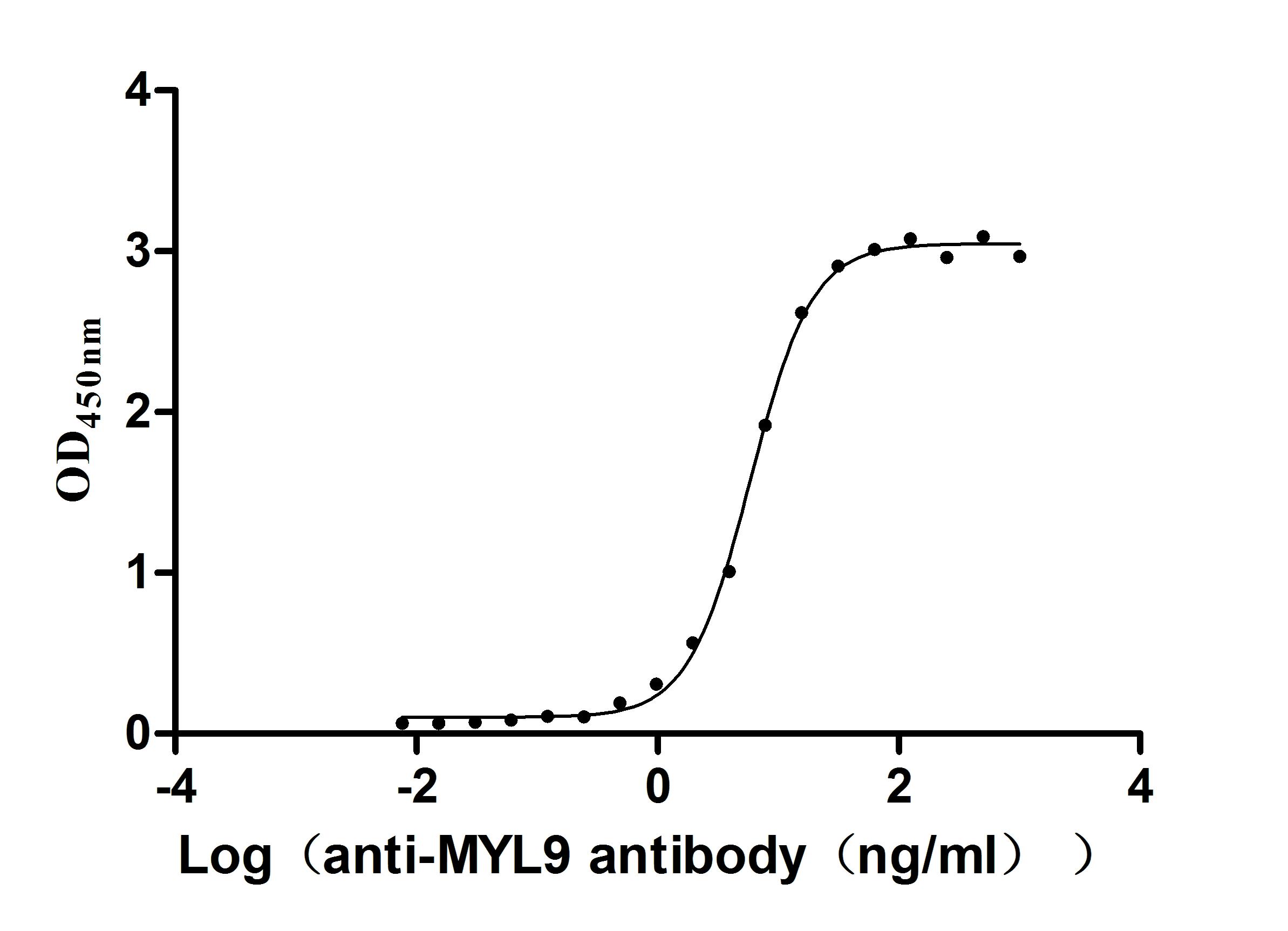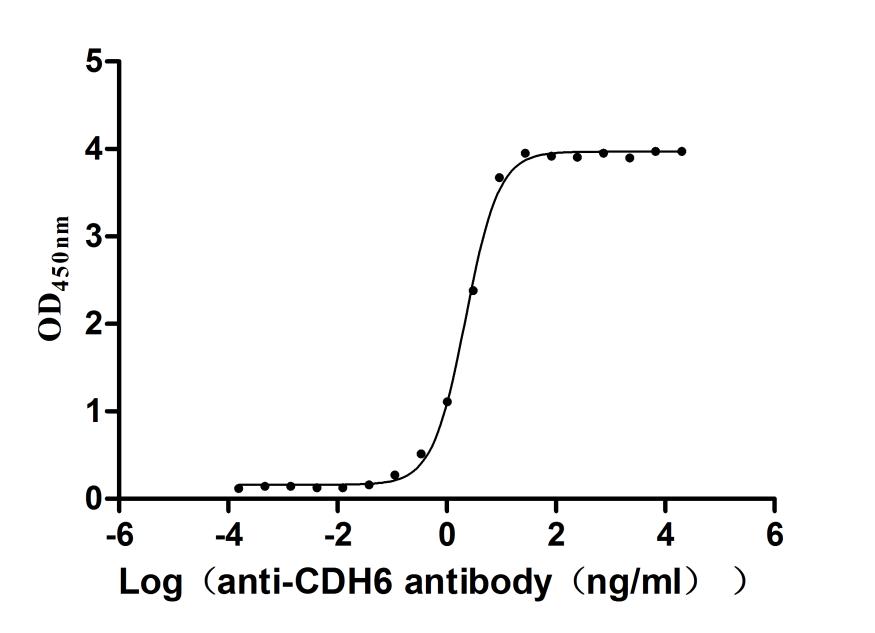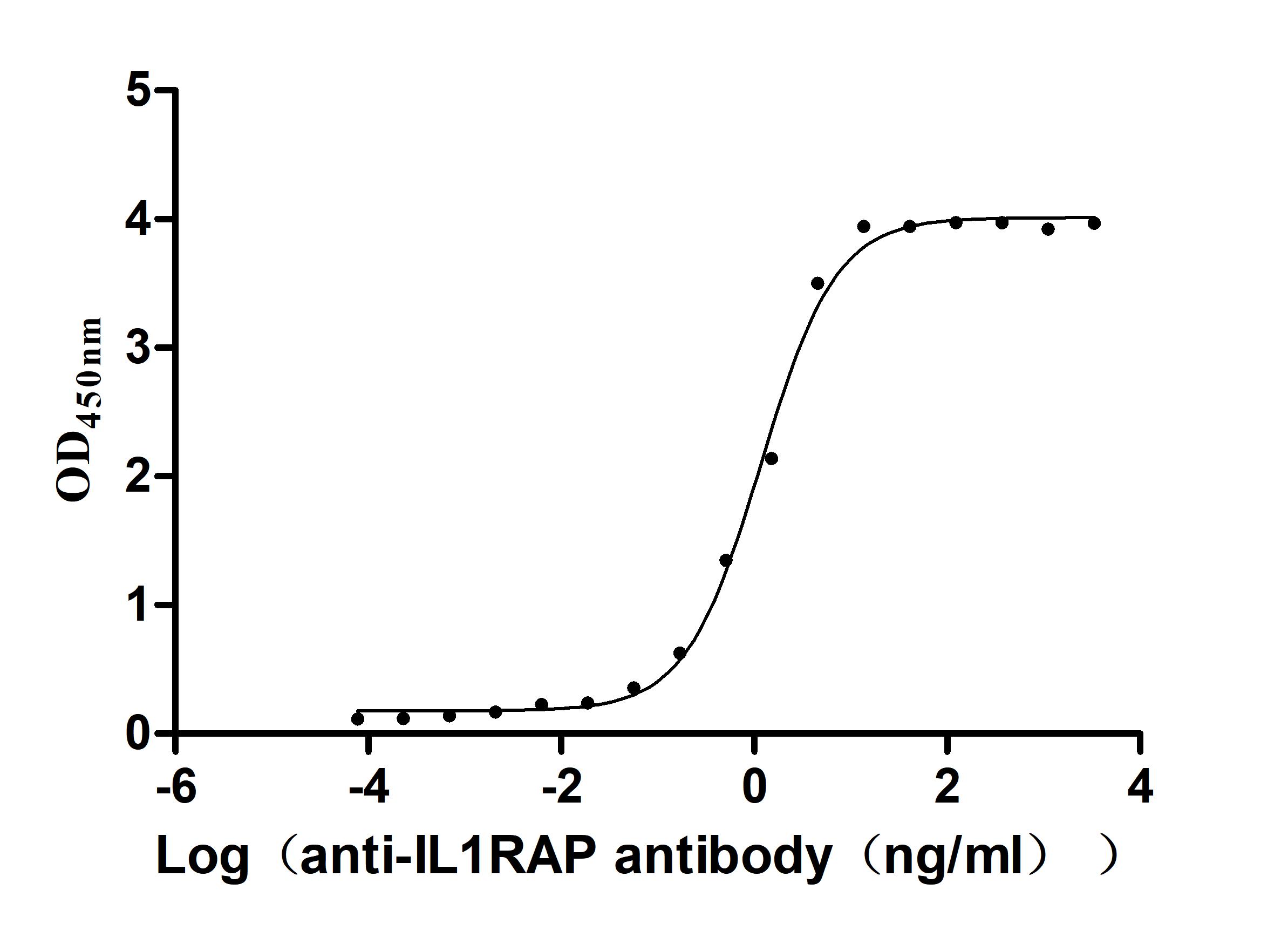Recombinant Human Cyclin-dependent kinase-like 5 (CDKL5), partial
-
中文名稱:Recombinant Human Cyclin-dependent kinase-like 5(CDKL5) ,partial
-
貨號(hào):CSB-YP005085HU
-
規(guī)格:
-
來(lái)源:Yeast
-
其他:
-
中文名稱:Recombinant Human Cyclin-dependent kinase-like 5(CDKL5) ,partial
-
貨號(hào):CSB-EP005085HU
-
規(guī)格:
-
來(lái)源:E.coli
-
其他:
-
中文名稱:Recombinant Human Cyclin-dependent kinase-like 5(CDKL5) ,partial
-
貨號(hào):CSB-EP005085HU-B
-
規(guī)格:
-
來(lái)源:E.coli
-
共軛:Avi-tag Biotinylated
E. coli biotin ligase (BirA) is highly specific in covalently attaching biotin to the 15 amino acid AviTag peptide. This recombinant protein was biotinylated in vivo by AviTag-BirA technology, which method is BriA catalyzes amide linkage between the biotin and the specific lysine of the AviTag.
-
其他:
-
中文名稱:Recombinant Human Cyclin-dependent kinase-like 5(CDKL5) ,partial
-
貨號(hào):CSB-BP005085HU
-
規(guī)格:
-
來(lái)源:Baculovirus
-
其他:
-
中文名稱:Recombinant Human Cyclin-dependent kinase-like 5(CDKL5) ,partial
-
貨號(hào):CSB-MP005085HU
-
規(guī)格:
-
來(lái)源:Mammalian cell
-
其他:
產(chǎn)品詳情
-
純度:>85% (SDS-PAGE)
-
基因名:CDKL5
-
Uniprot No.:
-
別名:Cdkl5; CDKL5_HUMAN; Cyclin dependent kinase 5 transcript; Cyclin-dependent kinase-like 5; EIEE2; ISSX; Serine/threonine kinase 9; Serine/threonine-protein kinase 9; Stk9
-
種屬:Homo sapiens (Human)
-
蛋白長(zhǎng)度:Partial
-
蛋白標(biāo)簽:Tag?type?will?be?determined?during?the?manufacturing?process.
The tag type will be determined during production process. If you have specified tag type, please tell us and we will develop the specified tag preferentially. -
產(chǎn)品提供形式:Lyophilized powder
Note: We will preferentially ship the format that we have in stock, however, if you have any special requirement for the format, please remark your requirement when placing the order, we will prepare according to your demand. -
復(fù)溶:We recommend that this vial be briefly centrifuged prior to opening to bring the contents to the bottom. Please reconstitute protein in deionized sterile water to a concentration of 0.1-1.0 mg/mL.We recommend to add 5-50% of glycerol (final concentration) and aliquot for long-term storage at -20℃/-80℃. Our default final concentration of glycerol is 50%. Customers could use it as reference.
-
儲(chǔ)存條件:Store at -20°C/-80°C upon receipt, aliquoting is necessary for mutiple use. Avoid repeated freeze-thaw cycles.
-
保質(zhì)期:The shelf life is related to many factors, storage state, buffer ingredients, storage temperature and the stability of the protein itself.
Generally, the shelf life of liquid form is 6 months at -20°C/-80°C. The shelf life of lyophilized form is 12 months at -20°C/-80°C. -
貨期:Delivery time may differ from different purchasing way or location, please kindly consult your local distributors for specific delivery time.Note: All of our proteins are default shipped with normal blue ice packs, if you request to ship with dry ice, please communicate with us in advance and extra fees will be charged.
-
注意事項(xiàng):Repeated freezing and thawing is not recommended. Store working aliquots at 4°C for up to one week.
-
Datasheet :Please contact us to get it.
相關(guān)產(chǎn)品
靶點(diǎn)詳情
-
功能:Mediates phosphorylation of MECP2. May regulate ciliogenesis.
-
基因功能參考文獻(xiàn):
- mutations in the CDKL5 gene in complex genotypes associated with West syndrome with variable phenotype PMID: 28780406
- The genetic etiology of Rett syndrome (RTT) without MECP2, CDKL5, and FOXG1 mutations is heterogeneous, overlaps with other NDDs, and complicated by a high mutation burden. Dysregulation of chromatin structure and abnormal excitatory synaptic signaling may form two common pathological bases of RTT. PMID: 27171548
- Although abilities were markedly impaired for the majority with the CDKL5 disorder, some females and a few males had better functional abilities. This variability may be related to underlying gene variants, with females with a late truncating variant having better levels of ability than those with no functional protein. PMID: 27528505
- We have characterised the predominant brain isoform of CDKL5, a 9.7 kb transcript comprised of 18 exons with a large 6.6 kb 3'-untranslated region (UTR), which we name hCDKL5_1. In addition we describe new exonic regions and a range of novel splice and UTR isoforms PMID: 27315173
- In the asymptomatic mother, the mutated copy of the CDKL5 gene was inactivated in 90% of blood cells. We also identified a premature stop codon (p.Arg926*) in IQSEC2 in a patient with a Rett-like phenotype. Finally, exome sequencing enabled us to characterize a heterozygous de novo missense (p.Val408Ala) in KCNA2 in a girl with infantile-onset seizures variant of Rett syndrome (RTT) PMID: 27062609
- The results suggested the mutant CDKL5 was responsible for the Rett syndrome disease. PMID: 27265524
- Rett syndrome with early epilepsy and the congenital variant are mainly due to variations in the CDKL5 and FOXG1 genes, respectively PMID: 26239053
- Mutations in exon 8 of cyclin-dependent kinase-like 5 gene were determined to be disease-causing in epileptic encephalopathy. PMID: 26701947
- study presents the genotype of 2 sisters, a CDKL5 mutation c. 283-3_290del, but different phenotype PMID: 25762588
- Data suggest that the increased dosage of cyclin dependent kinase like 5 protein(CDKL5) might have affected interactions of this kinase with its substrates, leading to perturbation of neurodevelopmental and neurobehavioral abnormalities. PMID: 25315662
- It was indicated that CDKL5 controls excitatory synaptic transmission and the conditions associated with CDKL5 deviation in man indicates synaptic abnormalities. PMID: 25864828
- CDKL5 gene mutations accounted for 5.4% of boys with early onset epileptic encephalopathy PMID: 25266480
- CDKL5 gene is not useful in practical molecular diagnosis of atypical Rett syndrome. PMID: 23756444
- Its mutation causes Rett syndrome.(review) PMID: 24738188
- Mutations in the CDKL5 gene associtaed with Hanefield variants of Rett syndrome and early-onset epileptic encephalopathies. PMID: 24564546
- study described the clinical condition and characterization of two first Brazilian patients with CDKL5 mutations, including the first Brazilian case of atypical Rett related to abnormalities in this gene PMID: 23828526
- CDKL5 mutations cause severe epilepsy in infancy with subsequent epileptic encephalopathy. PMID: 22832775
- aberrations of CDKL5 and ARX combined are an important consideration in the genetic forms of early-onset epilepsy in boys PMID: 23583054
- 3 known & 3 new (V966Im A1911V, H589H)mutations in the C-terminal domain of CDKL5 were found in Indian patients with Rett syndrome negative for MECP2. PMID: 23242510
- study examines the presence of breathing and sleep abnormalities in a small series of patients with CDKL5 mutations PMID: 23151060
- This review surveys the current state of CDKL5 research with emphasis on the clinical symptoms associated with mutations in CDKL5, the different mechanisms regulating its functions, and the connected molecular pathways. PMID: 22779007
- a functional axis between MYCN and CDKL5 governing both neuron proliferation rate and differentiation. PMID: 22921766
- CDKL5 is localized at excitatory synapses and contributes to correct dendritic spine structure and synapse activity. PMID: 22922712
- The importance of CDKL5 mutations as etiological factors in neurodevelopmental disorders was shown. The CDKL5 gene sequence and its rearrangements should be thoroughly analyzed in females with Rett syndrome, severe encephalopathy and epilepsy. PMID: 22867051
- Identification of eleven novel sequence variations including four pathogenic mutations in the CDKL5 gene. PMID: 23064044
- Recurrent mutations in the CDKL5 gene in patients with epileptic encephalopathies can be associated with either a milder or a more severe phenotype. PMID: 22678952
- The patients with clinical features of Rett syndrome, with epileptic encephalopathy before 6 months of age, regardless the presence of genetic abnormalities (mutations in MeCP2 or CDKL5 or both) or even in their absence. PMID: 22430159
- A novel CDKL5 mutation is identified in an ambulatory girl who had severe mental retardation and multiple types of seizures without Rett-like features. PMID: 21775177
- sought to determine the historic, clinical, and prognostic features of epilepsy secondary to CDKL5 mutations. all children developed infantile spasms. All children demonstrated developmental delay and visual impairment. PMID: 22264704
- This study present clinical phenotype of 5 girls having a mutation in the CDKL5 gene PMID: 21765152
- female CDKL5-mutated iPSCs maintain X-chromosome inactivation and clones express either the mutant CDKL5 allele or the wild-type allele that serve as an ideal experimental control. PMID: 21750574
- CDKL5 deficit may induce changes in synaptic plasticity in the patient's brain. PMID: 21107515
- mutations in early onset epileptic encephalopathy PMID: 21770923
- Two patients (one female, one male) with CDKL5 mutations have epileptic spasms after tonic seizures but never present infantile spasms as the main seizure type or hypsarrhythmia in electroencephalography. PMID: 20493745
- A novel CDKL5 exon and pathogenic mutations in patients with severe mental retardation, early-onset seizures and Rett-like features. PMID: 21318334
- We report the first case of an exonic deletion of CDKL5 in a male and emphasize the importance of underappreciated mosaic exonic copy number variation in patients with early-onset seizures and RTT-like features of both genders. PMID: 21293276
- the distinctive hypermotor-tonic-spasms sequence is a feature of CDKL5 epileptic encephalopathy. PMID: 21502606
- CDKL5 exon 16b should now be considered in the genetic screening of patients presenting with a CDKL5-related disease profile. PMID: 21124335
- Infants with CDKL5-related early epileptic encephalopathy can present in the first year of life with an unusual. PMID: 21309761
- CDKL5 mutation is associated with epileptic encephalopathy. PMID: 20602487
- Data indicate that MEF2C missense de novo mutations in severe mental retardation showed diminished MECP2 and CDKL5 expression. PMID: 20513142
- seven polymorphic variations and four de novo mutations of the CDKL5 gene were identified, and in all instances of the latter the clinical phenotype was that of an epileptic encephalopathy. PMID: 20397747
- a novel p.Arg970X mutation in the last exon of the CDKL5 gene resulting in late onset seizure disorder. PMID: 19428276
- We found CDKL5 mutations in 8.2% (4 of 49) of patients and genomic deletions in 8.2% (4 of 49). Overall, abnormalities of the CDKL5 gene accounted for 16.3% (8 of 49) of patients. PMID: 19780792
- CDKL5 is involved in pre-mRNA processing, by controlling splicing factor dynamics. PMID: 19740913
- CDKL5 mutations are associated with epilepsy, X-linked mental retardation and a clinical phenotype that overlaps Rett syndrome. PMID: 15492925
- A proportion of Rett syndrome atypical cases may result from mutations in CDKL5. (review) PMID: 15635068
- demonstrate that MeCP2 and CDKL5 interact both in vivo and in vitro and that CDKL5 is indeed a kinase, which is able to phosphorylate itself and to mediate MeCP2 phosphorylation PMID: 15917271
- novel pathogenic CDKL5 mutations were identified in three girls, two of whom had initially been diagnosed with the early onset seizure variant of Rett Syndrome (RTT) and the other with early onset seizures and some features of RTT PMID: 16015284
- Patients with the CDKL5 mutation have an early onset, epileptic encephalopathy in infancy that evolves into myoclonic seizures in childhood with a unique EEG pattern. PMID: 16326141
顯示更多
收起更多
-
相關(guān)疾病:Epileptic encephalopathy, early infantile, 2 (EIEE2)
-
亞細(xì)胞定位:Nucleus. Cytoplasm, cytoskeleton, cilium basal body. Cytoplasm, cytoskeleton, microtubule organizing center, centrosome.
-
蛋白家族:Protein kinase superfamily, CMGC Ser/Thr protein kinase family, CDC2/CDKX subfamily
-
組織特異性:Expressed in brain, lung, kidney, prostate, ovary, placenta, pancreas and testis.; [Isoform 2]: Predominant transcript in brain.
-
數(shù)據(jù)庫(kù)鏈接:
Most popular with customers
-
Recombinant Human Glucagon-like peptide 1 receptor (GLP1R), partial (Active)
Express system: Mammalian cell
Species: Homo sapiens (Human)
-
Recombinant Human C-C chemokine receptor type 8 (CCR8)-VLPs (Active)
Express system: Mammalian cell
Species: Homo sapiens (Human)
-
Recombinant Human C-type lectin domain family 4 member C (CLEC4C), partial (Active)
Express system: Mammalian cell
Species: Homo sapiens (Human)
-
Recombinant Human Myosin regulatory light chain 12A (MYL12A) (Active)
Express system: E.coli
Species: Homo sapiens (Human)
-
Recombinant Macaca fascicularis Cadherin 6(CDH6),partial (Active)
Express system: Mammalian cell
Species: Macaca fascicularis (Crab-eating macaque) (Cynomolgus monkey)
-
Recombinant Human Interleukin-1 receptor accessory protein (IL1RAP), partial (Active)
Express system: Mammalian cell
Species: Homo sapiens (Human)


